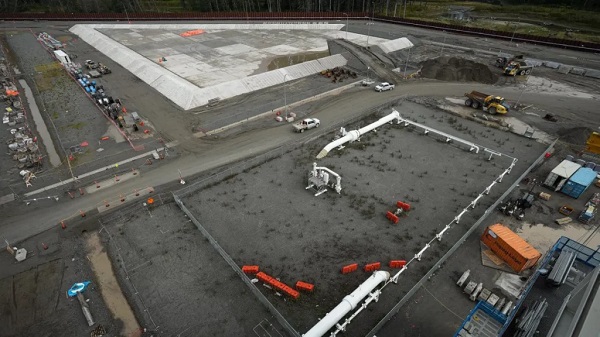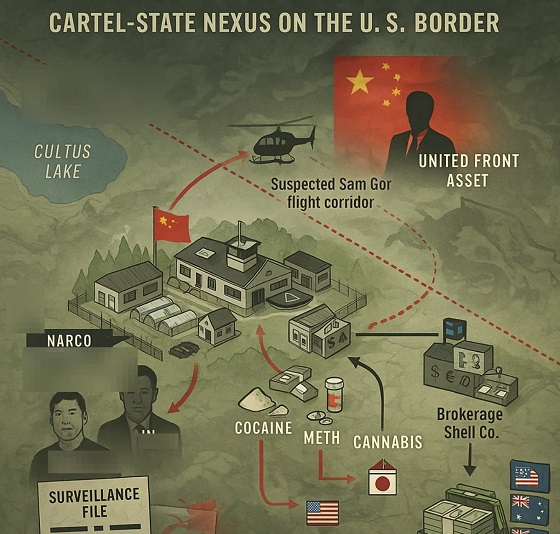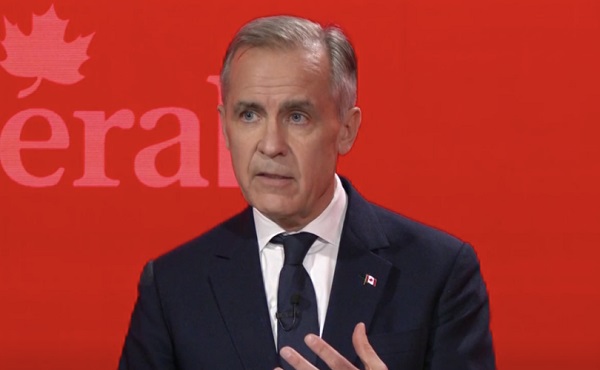Agriculture
Canadian pandemic bill wants to regulate meat production, develop contract tracing

From LifeSiteNews
Included in Bill C-293 are provisions to ‘regulate commercial activities that can contribute to pandemic risk, including industrial animal agriculture,’ produce ‘alternative proteins,’ and ‘enable contact tracing of persons.’
A “pandemic prevention and preparedness” bill introduced by a backbencher MP of Justin Trudeau’s Liberal Party would give sweeping powers to “prevent” as well as “prepare” for a future pandemic, including regulating Canadian agriculture.
Bill C-293, or “An Act respecting pandemic prevention and preparedness,” is now in its second reading in the Senate. The bill would amend the Department of Health Act to allow the minister of health to appoint a “National pandemic prevention and preparedness coordinator from among the officials of the Public Health Agency of Canada to coordinate the activities under the Pandemic Prevention and Preparedness Act.”
Bill C-293 was introduced to the House of Commons in the summer of 2022 by Liberal MP Nathaniel Erskine-Smith. The House later passed the bill in June of 2024 with support from the Liberals and NDP (New Democratic Party), with the Conservatives and Bloc Quebecois opposing it.
A close look at this bill shows that, if it becomes law, it would allow the government via officials of the Public Health Agency of Canada, after consulting the Minister of Agriculture and Agri-Food and of Industry and provincial governments, to “regulate commercial activities that can contribute to pandemic risk, including industrial animal agriculture.”
Text from the bill also states that the government would be able to “promote commercial activities that can help reduce pandemic risk,” which includes the “production of alternative proteins, and phase out commercial activities that disproportionately contribute to pandemic risk, including activities that involve high-risk species.”
It is not clear when Bill C-293 will proceed to the third reading in the Senate. When it was in the House, it took over a year for it to go from the second to the third reading. Should an early election be called this year, or the bill not get to its third reading before the fall of October of 2025, the bill will die.
As reported by LifeSiteNews, the Trudeau government has funded companies that produce food made from bugs. The Great Reset of Klaus Schwab and his World Economic Forum (WEF) has as part of its agenda the promotion of “alternative” proteins such as insects to replace or minimize the consumption of beef, pork, and other meats that they say have high “carbon” footprints.
Trudeau’s current environmental goals are in lockstep with the United Nations’ “2030 Agenda for Sustainable Development” and include phasing out coal-fired power plants, reducing fertilizer usage, and curbing natural gas use over the coming decades, as well as curbing red meat and dairy consumption.
Bill would give the government powers to ‘enable contact tracing’ 
Bill C-293 would allow the government to mandate industry help it in procuring products relevant to “pandemic preparedness, including vaccines, testing equipment and personal protective equipment, and the measures that the Minister of Industry intends to take to address any supply chain gaps identified.”
It would also allow the minister of industry to procure the “communications capacity and infrastructure for electronic platforms and tools,” which includes electronic applications that “enable contact tracing of persons exposed to infectious diseases that could lead to pandemics.”
The bill will also “take into account the recommendations made by the advisory committee following its review of the response to the coronavirus disease 2019 (COVID-19) pandemic in Canada.”
The federal government, and most provincial governments, during COVID, pushed and enacted contact tracing to monitor the general population. Any Canadians who traveled out of the country had to also use the government’s much maligned and scandal-ridden ArriveCAN travel app, which had a contact tracing feature.
Also during COVID, the Trudeau government took a heavy-handed approach when it came to enacting laws or rules under the guise of “health.” For example, in October 2021 Trudeau announced unprecedented COVID-19 jab mandates for all federal workers and those in the transportation sector. He also announced that the unvaccinated would no longer be able to travel by air, boat, or train, both domestically and internationally.
This policy resulted in thousands losing their jobs or being placed on leave for non-compliance. It also trapped “unvaccinated” Canadians in the country.
Agriculture
Canada is missing out on the global milk boom

This article supplied by Troy Media.
 By Sylvain Charlebois
By Sylvain Charlebois
With world demand soaring, Canada’s dairy system keeps milk producers locked out of growth, and consumers stuck with high prices
Prime Minister Mark Carney is no Justin Trudeau. While the team around him may be familiar, the tone has clearly shifted. His first week in office signalled a more data-driven, technocratic approach, grounded in pragmatism rather than ideology. That’s welcome news, especially for Canada’s agri-food sector, which has long been overlooked.
Historically, the Liberal party has governed with an urban-centric lens, often sidelining agriculture. That must change. Carney’s pledge to eliminate all interprovincial trade barriers by July 1 was encouraging but whether this includes long-standing obstacles in the agri-food sector remains to be seen. Supply-managed sectors, particularly dairy, remain heavily protected by a tangle of provincially administered quotas (part of Canada’s supply management system, which controls prices and limits production through quotas and tariffs to protect domestic producers). These measures stifle innovation, limit flexibility and distort national productivity.
Consider dairy. Quebec produces nearly 40 per cent of Canada’s milk, despite accounting for just over 20 per cent of the population. This regional imbalance undermines one of supply management’s original promises: preserving dairy farms across the country. Yet protectionism hasn’t preserved diversity—it has accelerated consolidation.
In reality, the number of dairy farms continues to decline, with roughly 90 per cent now concentrated in just a few provinces. On our current path, Canada is projected to lose nearly half of its remaining dairy farms by 2030. Consolidation disproportionately benefits Quebec and Ontario at the expense of smaller producers in the Prairies and Atlantic Canada.
Carney must put dairy reform back on the table, regardless of campaign promises. The sector represents just one per cent of Canada’s GDP, yet
wields outsized influence on policy, benefiting fewer than 9,000 farms out of more than 175,000 nationwide. This is not sustainable. Many Canadian producers are eager to grow, trade and compete globally but are held back by a system designed to insulate rather than enable.
It’s also time to decouple dairy from poultry and eggs. Though also supply managed, those sectors operate with far more vertical integration and
competitiveness. Industrial milk prices in Canada are nearly double those in the United States, undermining both our domestic processors and consumer affordability. These high prices don’t just affect farmers—they directly impact Canadian consumers, who pay more for milk, cheese and other dairy products than many of their international counterparts.
The upcoming renegotiation of CUSMA—the Canada-United States-Mexico Agreement, which replaced NAFTA—is a chance to reset. Rather than resist change, the dairy sector should seize the opportunity to modernize. This includes exploring a more open quota system for export markets. Reforms could also involve a complete overhaul of the Canadian Dairy Commission to increase transparency around pricing. Canadians deserve to know how much milk is wasted each year—estimated at up to a billion litres—and whether a strategic reserve for powdered milk, much like our existing butter reserve, would better serve national food security.
Global milk demand is rising. According to The Dairy News, the world could face a shortage of 30 million tonnes by 2030, three times Canada’s current annual production. Yet under current policy, Canada is not positioned to contribute meaningfully to meeting that demand. The domestic focus on protecting margins and internal price fairness is blinding the sector to broader market realities.
We’ve been here before. The last time CUSMA was renegotiated, Canada offered modest concessions to foreign competitors and then overcompensated its dairy sector for hypothetical losses. This created an overcapitalized industry, inflated farmland prices and diverted attention from more pressing trade and diplomacy challenges, particularly with India and China. This time must be different: structural reform—not compensation—should be the goal.
If Carney is serious about rebooting the Canadian economy, agri-food must be part of the conversation. But that also means the agriculture sector must engage. Industry voices across the country need to call on dairy to evolve, embrace change and step into the 21st century.
Dr. Sylvain Charlebois is a Canadian professor and researcher in food distribution and policy. He is senior director of the Agri-Food Analytics Lab at Dalhousie University and co-host of The Food Professor Podcast. He is frequently cited in the media for his insights on food prices, agricultural trends, and the global food supply chain.
Troy Media empowers Canadian community news outlets by providing independent, insightful analysis and commentary. Our mission is to support local media in helping Canadians stay informed and engaged by delivering reliable content that strengthens community connections and deepens understanding across the country.
Agriculture
Liberal win puts Canada’s farmers and food supply at risk

This article supplied by Troy Media.
A fourth Liberal term means higher carbon taxes and trade risks. Could Canada’s farmers and food security be on the line?
The Liberal Party, now led by Mark Carney, has secured a fourth consecutive term, albeit once again with a minority mandate. This time, however, the Liberals have a stronger hand, as they can rely not only on the NDP but also the Bloc Québécois to maintain power.
This broader base of parliamentary support could provide much-needed political stability at a crucial time, particularly as Canada prepares for a new round of trade negotiations with the United States and Mexico.
For the agri-food sector, the implications are significant. From carbon taxes to trade rules, federal decisions play a decisive role in shaping the costs and risks Canadian farmers face.
First and foremost, carbon pricing will remain a central issue. Carney has made it clear that the industrial carbon tax will stay—a policy that continues to erode the competitiveness of Canada’s agri-food sector, where fuel, fertilizer and transportation costs are especially sensitive to carbon pricing. The tax, currently set at $95 per metric tonne, is scheduled to climb to $170 by 2030.
While consumers may not see this tax directly, businesses certainly do. More concerning is the Liberals’ intention to introduce a border carbon adjustment for imports from countries without equivalent carbon pricing regimes. While this could theoretically protect Canadian industry, it also risks making food even more expensive for Canadian consumers, particularly if the U.S., our largest trading partner, remains uninterested in adopting similar carbon measures. Acting alone risks undermining both our food security and our global competitiveness.
Another looming issue is supply management. Although all parties pledged during the campaign not to alter Canada’s system for dairy, poultry and eggs, this framework—built on quotas and high import tariffs—is increasingly outdated. It is almost certain to come under pressure during trade negotiations. The American dairy lobby, in particular, will continue to demand greater access to Canadian markets. The Liberals have a chance to chart a more forward-looking path. Modernizing supply management could lead to a more competitive, resilient industry while providing consumers with greater choice and better prices.
The previous Parliament’s passage of Bill C-282, which sought to shield supply managed sectors from all future trade negotiations, was a deeply flawed move.
Fortunately, the new parliamentary makeup should make it far less likely that such protectionist legislation will survive. A more pragmatic approach to trade policy appears possible.
On the domestic front, there are reasons for cautious optimism. The Liberals have promised to eliminate remaining federal barriers to interprovincial trade and to improve labour mobility, longstanding obstacles to the efficient movement of agri-food products across Canada. For example, differing provincial rules often prevent products like cheese, meat or wine from being sold freely across provinces, frustrating farmers and limiting consumer choice. Momentum was building before the election, and it must continue if we are serious about building a stronger domestic food economy.
Infrastructure investment is another bright spot. The Liberals pledged more than $5 billion through a Trade Diversification Corridor Fund to upgrade Canada’s severely undercapitalized export infrastructure. Strategic investment in trade gateways is overdue and critical for agri-food exporters looking to reduce reliance on the United States and expand into global markets.
Finally, the Liberal platform was alone in explicitly committing to support food processing in Canada, a crucial pillar of domestic food security. An increased focus on manufacturing will not only create jobs but also reduce reliance on imported food products, making Canada more resilient in the face of global disruptions.
Farmers have long felt sidelined by urban-centric Liberal governments. The past four years were marked by regulatory and trade clashes that deepened that divide. The hope now is that with greater political stability and a clearer focus on competitiveness, the next four years will bring a more constructive relationship between Ottawa and Canada’s agri-food sector.
If the Liberals are serious about food security and economic growth, now is the time to reset the relationship with Canada’s farmers, not ignore them yet again.
Dr. Sylvain Charlebois is a Canadian professor and researcher in food distribution and policy. He is senior director of the Agri-Food Analytics Lab at Dalhousie University and co-host of The Food Professor Podcast. He is frequently cited in the media for his insights on food prices, agricultural trends, and the global food supply chain.
Troy Media empowers Canadian community news outlets by providing independent, insightful analysis and commentary. Our mission is to support local media in helping Canadians stay informed and engaged by delivering reliable content that strengthens community connections and deepens understanding across the country.
-

 Alberta6 hours ago
Alberta6 hours agoPremier Smith seeks Alberta Accord: Announces new relationship with Ottawa
-

 Energy5 hours ago
Energy5 hours agoIt’s time to get excited about the great Canadian LNG opportunity
-

 Crime4 hours ago
Crime4 hours agoInside B.C.’s Cultus Lake Narco Corridor — How Chinese State-Linked Syndicates are Building a Narco Empire in Canada
-

 Energy8 hours ago
Energy8 hours agoIs the Carney Government Prepared to Negotiate a Fair Deal for the Oil, Gas and Pipeline Sectors
-

 Health9 hours ago
Health9 hours agoJay Bhattacharya Closes NIH’s Last Beagle Lab
-

 Business10 hours ago
Business10 hours agoWelcome to Elon Musk’s New Company Town: ‘Starbase, TX’ Votes To Incorporate
-

 Alberta2 hours ago
Alberta2 hours agoEnergy projects occupy less than three per cent of Alberta’s oil sands region, report says
-

 Daily Caller3 hours ago
Daily Caller3 hours agoMisguided Climate Policies Create ‘Real Energy Emergency’ And Permit China To Dominate US

